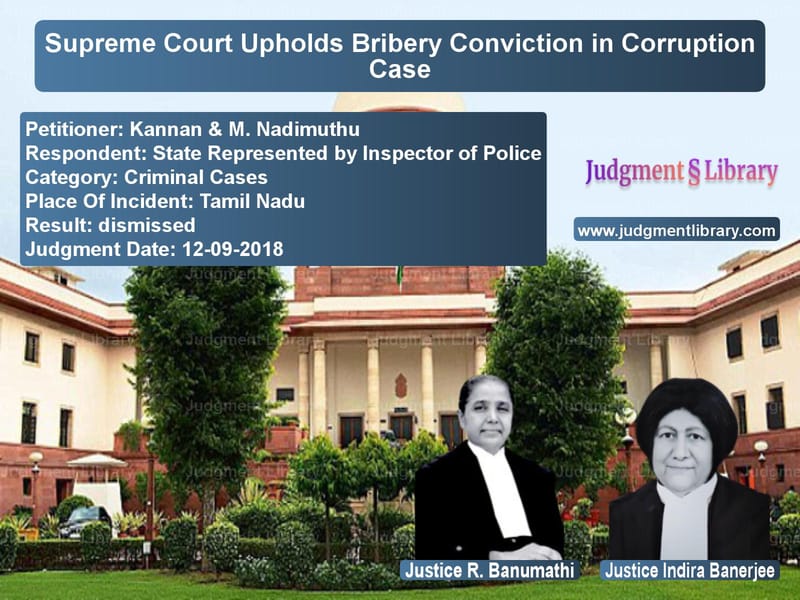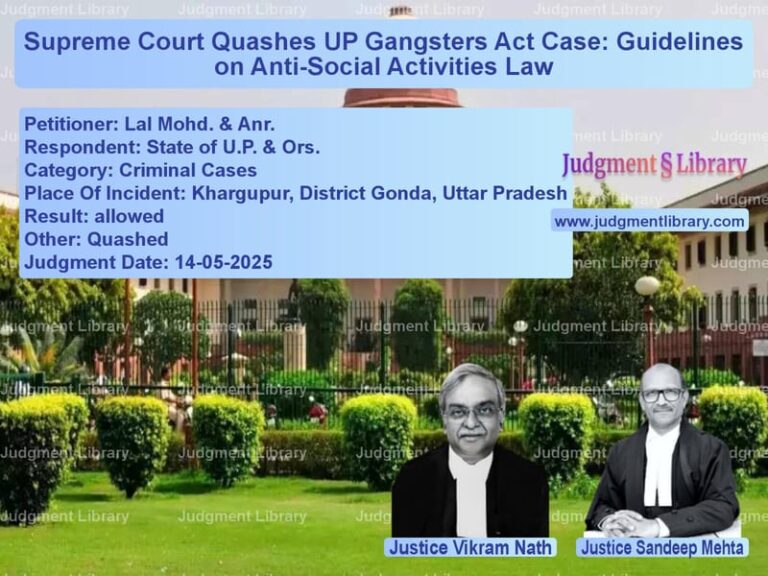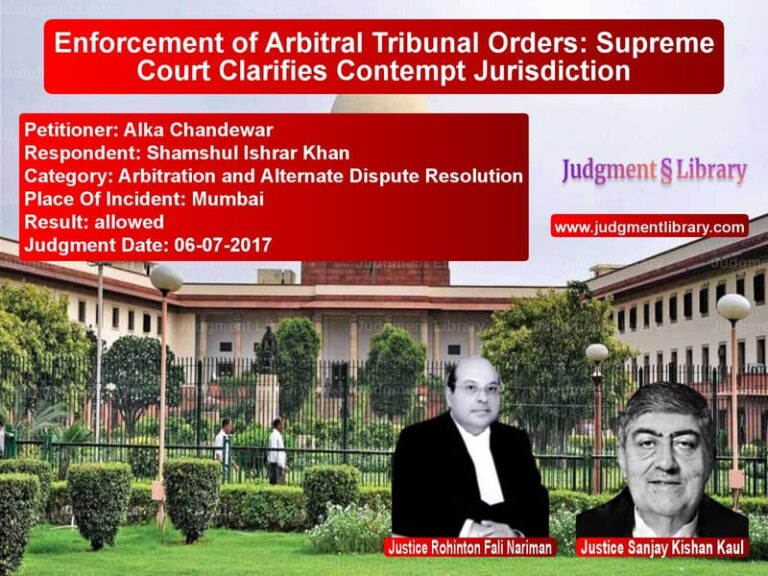Supreme Court Upholds Bribery Conviction in Corruption Case
The Supreme Court of India, in the case of Kannan vs. State Represented by Inspector of Police and M. Nadimuthu vs. State of Tamil Nadu, dealt with a crucial issue regarding bribery under the Prevention of Corruption Act, 1988. The case involved the conviction of two public officials accused of demanding and accepting bribes in exchange for official favors. The Court upheld the convictions under Section 7 and Section 13(2) read with Section 13(1)(d) of the Prevention of Corruption Act and directed the appellants to serve their remaining sentences.
Background of the Case
The case dates back to October 1994, when the first appellant, M. Nadimuthu, an Assistant Commercial Tax Officer, and the second appellant, Kannan, a government employee, were accused of demanding a bribe from a shop owner for the return of seized account books. The incident took place at a grocery shop named Ambika Stores, owned by the father of Sabapathy (PW-2).
On 19 October 1994, the shop was inspected by the Deputy Commercial Tax Officer (PW-4), accompanied by the first accused. During this inspection, the tax officials seized the store’s account books. Following this, the store owner’s son, PW-2, approached the first accused (A-1) requesting the return of the books, to which A-1 allegedly demanded a bribe of Rs. 2000.
After several rounds of negotiations, the bribe amount was reduced to Rs. 800, which was to be paid on 1 November 1994. However, before making the payment, PW-2 lodged a complaint with the Vigilance and Anti-Corruption Wing. Based on this complaint, an FIR was registered, and a trap was set up.
The Bribery Trap and Arrest
On 1 November 1994, as planned, PW-2 visited the office of A-1 with marked currency notes. The Vigilance team had applied a phenolphthalein powder on the notes to detect bribery. Upon arrival, A-1 inquired whether PW-2 had brought the money, to which he responded affirmatively. However, instead of taking the money directly, A-1 instructed Kannan (A-2) to receive the amount.
As soon as Kannan accepted the bribe, the Vigilance team entered the premises and conducted a sodium carbonate solution test, which turned red, confirming that Kannan had handled the tainted notes. The officials arrested both accused on the spot.
Trial Court Proceedings
The Trial Court found the accused guilty under:
- Section 7 of the Prevention of Corruption Act (Public servant taking gratification other than legal remuneration).
- Section 13(2) read with Section 13(1)(d) (Criminal misconduct by a public servant).
Both accused were sentenced to two years’ rigorous imprisonment. They appealed this decision before the Madras High Court.
High Court’s Findings
The High Court, while upholding the conviction, reduced the sentence to one year of rigorous imprisonment. It observed that:
- The evidence of PW-2 regarding the demand and acceptance of the bribe was consistent.
- The bribery trap was successfully executed, and the phenolphthalein test confirmed the presence of bribe money.
- The corroborative testimonies of other prosecution witnesses, including PW-3 and PW-6, further strengthened the case.
Unhappy with this decision, the appellants approached the Supreme Court.
Supreme Court’s Observations
The Supreme Court carefully examined the trial records and the judgments of the lower courts. The key observations made by the bench were:
- “The demand and acceptance of the bribe amount by A-1 and A-2 are clearly proven by PW-2’s testimony.”
- “The phenolphthalein test results corroborate the trap team’s findings and leave no doubt about the acceptance of bribe money.”
- “The evidence of PW-6, the office assistant, further corroborates the prosecution’s case, as he confirmed that A-1 directed A-2 to collect the bribe.”
- “There is no valid reason to interfere with the findings of the High Court, as both the demand and receipt of bribe money have been sufficiently proved.”
Final Judgment
The Supreme Court dismissed the appeals and upheld the convictions under Sections 7 and 13(2) read with Section 13(1)(d) of the Prevention of Corruption Act. The appellants were directed to:
- Surrender to custody within eight weeks to serve the remainder of their sentences.
- Failing to surrender, the concerned authorities were directed to take them into custody.
Impact of the Judgment
This ruling sets a strong precedent against bribery and corruption in public offices. Key takeaways from the judgment include:
- Strict enforcement of anti-corruption laws: The case reinforces that courts will not tolerate corrupt practices in government offices.
- Validation of bribery traps: The successful execution of the trap demonstrates the effectiveness of vigilance teams in catching corrupt officials.
- Supreme Court’s stance on public accountability: Public servants must be held to the highest standards of integrity, and those engaging in bribery will face serious consequences.
By upholding the lower courts’ decisions, the Supreme Court reaffirmed its commitment to curbing corruption in government services.
Petitioner Name: Kannan & M. Nadimuthu.Respondent Name: State Represented by Inspector of Police.Judgment By: Justice R. Banumathi, Justice Indira Banerjee.Place Of Incident: Tamil Nadu.Judgment Date: 12-09-2018.
Don’t miss out on the full details! Download the complete judgment in PDF format below and gain valuable insights instantly!
Download Judgment: Kannan & M. Nadimuth vs State Represented by Supreme Court of India Judgment Dated 12-09-2018.pdf
Direct Downlaod Judgment: Direct downlaod this Judgment
See all petitions in Fraud and Forgery
See all petitions in Public Sector Employees
See all petitions in Money Laundering Cases
See all petitions in Judgment by R. Banumathi
See all petitions in Judgment by Indira Banerjee
See all petitions in dismissed
See all petitions in supreme court of India judgments September 2018
See all petitions in 2018 judgments
See all posts in Criminal Cases Category
See all allowed petitions in Criminal Cases Category
See all Dismissed petitions in Criminal Cases Category
See all partially allowed petitions in Criminal Cases Category







